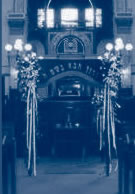|
SEDRA : Vayechi : Hertz Chumash p. 180
Genesis Chap. 47 v. 28
SYNOPSIS:
Jacob had reached the age of 147 years. Feeling that the
end of his life was approaching, Jacob sent for Joseph and
made him swear that he would not bury him in Egypt but in
the land of Canaan, in the resting place of his fathers. Later
Jacob became very ill and Joseph went to visit him with his
two sons, Manesseh and Ephraim. The dying patriarch blessed
Joseph and his sons and proclaimed Manesseh and Ephraim as
his own. By placing his right hand on Ephraim's head, in spite
of Joseph's protests, Jacob gave him precedence over his older
brother. He foretold that, though both would enjoy prosperity,
Ephraim's prowess would be the greater and ended by promising
Joseph a portion more than his brothers. Jacob then called
all his other sons to his beside and, in prophetic words,
summed up their personal qualities and predicted their future
destinies. After enjoining his sons once again to bury him
in the cave of Machpelah where Abraham, Sarah, Isaac, Rebeccah
and Leah had been buried, Jacob died. Joseph ordered that
the body be embalmed and mourning was observed for seventy
days. Then, with Pharaoh's permission, Joseph and all his
brethren together with the elders of Israel and Egypt escourted
a military entourage, carried Jacob's body with great solemnity
into Canaan to bury him in Ma'arat Hamachpelah - the ancestral
grave.
On their return to Egypt, Joseph's brothers, afraid that
Joseph would avenge himself on them, sought his pardon for
their past misdeeds. This, they said, was in accordance with
the express wish of their father on his death bed, but Joseph
assured them that he no longer bore any grudge against them.
Joseph survived his father for fifty four years. Before he
died at the age of one hundred and ten years, Joseph made
the members of his family swear an oath to carry his remains
with them when G-d brought them back to the Promised Land
and so his body was embalmed and placed in a coffin.
HAPHTORAH HERTZ CHUMASH p. 191 1 Kings Chapter 2 Verses
1 - 12
The Testament of Jacob to his children before his death finds
its echo in the Haphtorah which describes the King David's
advice and wishes to Solomon prior to his death. The message
includes a charge to guard the Sacred mission of the people
as set out in the Torah. He is also warned not to "go
soft" on certain political foes.
TELL ME RABBI ... THE SABBATH CANDLES
Lighting of the Sabbath candles formally ushers in the Sabbath
for the members of the household. It has usually been tradition
for the wife to fulfil this religious obligation. Unless a
woman has been living alone, she begins to observe the kindling
of Shabbat candles on the first Sabbath after her marriage.When
two or more married women are in the same household, either
on a temporary or permanent basis, it is customary for each
to light Sabbath candles separately. When the woman of a house
is absent or is incapable of performing the ritual, or where
a man lives alone, he lights the Sabbath candles himself.
Although the woman is given priority in fulfilling this religious
duty, lighting Sabbath candles is a requirement related to
the general observance of the Sabbath and is a religious duty
incumbent upon both men and women.
The Sabbath candles are kindled approximately twenty minutes
before sunset. In the absence of a Jewish calendar listing
candle-lighting time for a particular geographic area, the
time of sunset can be found in the daily local newspaper and
the candle lighting time determined accordingly. Once the
time of sunset passes, the candles may no longer be lit. It
is permissible for the candles to be lit somewhat earlier.
This is often done in the summer months when the day is particularly
long and the Sabbath might be ushered in an hour or so earlier.
The minimum number of candles to be kindled is two. They
symbolically represent the two forms of the fourth commandment:
Zachor - "Remember the Sabbath day to keep it holy"
(Exodus 20:8), and Shamor - "Observe the Sabbath day
to keep it holy" (Deut.5:12).
There are some family or local traditions where three or
more candles are kindled, or that call for an additional Sabbath
candle for every child born. One is free to light more than
the minimum if one chooses to do so. White candles intended
specifically for the Sabbath eve are generally available.
If they are not available, any festive dinner candles ofwhatever
shape, design, or colour may be used instead. The lighting
of oil lamps or the traditional "Sabbath (oil) lamp"
may still be observed among some. The only condition is that
they be large enough to burn during the Sabbath meal and well
into nightfall.
Although any candelabra are permissible, it is preferable
to have a pair of candlesticks or candelabra reserved specifically
for the Sabbath. The beautiful custom of setting aside money
for charity prior to lighting the Shabbat candles is to be
encouraged. Although proper ritual procedure requires that
the recitation of a blessing always precedes the performance
of the mitzvah, in this instance the candles are lit first
and the benediction is recited afterward. The reason is that
the recital of the blessing formally ushers in the Sabbath
after which it is forbidden to light a flame.
The procedure is to close one's eyes or cover them with the
hands while the benediction is recited. When eyes are opened
after the blessing, the sight of the Sabbath light brings
forth the delight that is actually regarded as the culmination
of the mitzvah. The blessing recited for the Sabbath candles
is : "Baruch ata ad-onai elo-hainu melech ha-olam aher
kidshanu b'mitzvotav v'tzivanu l'hadlik ner shel shabbat".
Blessed are Thou, Lord our G-d, King of the Universe who has
sanctified us with His commandments and commanded us to kindle
the Sabbath lights. After the candles are lit, it is proper
to greet the others in the household with the words "Shabbat
Shalom." Everyone responds likewise. The Sabbath candles
should be either on the table where the Sabbath meal is eaten
or, if this is impractical, it should at least be placed in
the same room. (Under exceptional circumstances, as when staying
at a hotel or resort, or when confined for illness, etc; this
requirement is waived, and the candles may be kindled wherever
it is most practical to do so).
"Shabbat Shalom" is generously sponsored by Rosetta
and Nathan Baron
BACK TO SHABBAT SHALOM
TABLE
|








